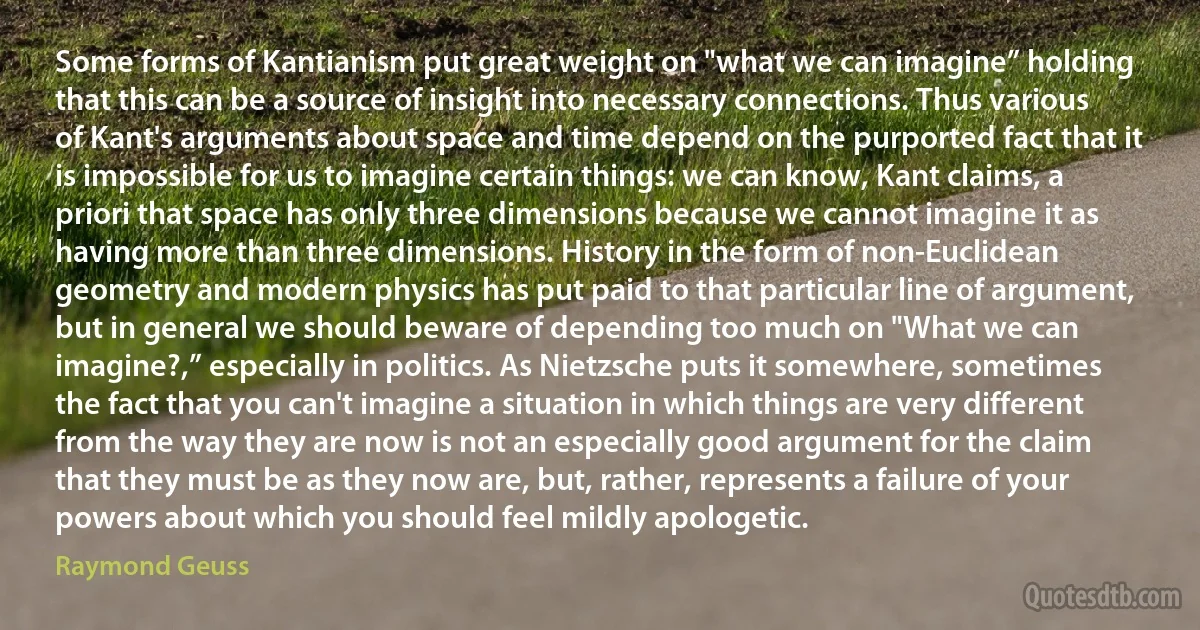Raymond Geuss quotes - page 2
The notion of being an "enlightened” person does not reduce simply to that of being a person who has highly developed cognitive abilities or disposes of a vast stock of knowledge; neither does it reduce to the idea of being a morally good or socially useful person. "Enlightenment” is not a value-free concept because it is connected with some idea of devoting persistent, focused attention to that which is genuinely important in human life, rather than to marginal or subsidiary phenomena, to drawing the "correct” conclusions from attending to these important features-whatever they are-and to embodying these conclusions concretely in one's general way of living. It involves a certain amount of sheer knowledge, an ability to concentrate and reflect, inventiveness in restructuring one's psychic, personal, and social habits; but to be enlightened is not to "have” any bit of doctrine, but to have been (re)structured in a certain way.

Raymond Geuss
In its origin, liberalism had no ambition to be universal either in the sense of claiming to be valid for everyone and every human society or in the sense of purporting to give an answer to all the important questions of human life. ... The ideal of liberalism is a practically engaged political philosophy that is both epistemically and morally highly abstemious. That is, at best, a very difficult and possibly a completely hopeless project. It is therefore not surprising that liberals succumb again and again to the temptation to go beyond the limits they would ideally like to set for themselves and try to make of liberalism a complete philosophy of life. ... In the middle of the twentieth century, Kantianism presented itself as a "philosophical foundation” for a version of liberalism, and liberals at that time were sufficiently weak and self-deceived (or strong and opportunistic) to accept the offer.

Raymond Geuss
Intellectual honesty requires that one reflect on the contribution one's theory makes to the class struggle, and acknowledge it openly. One does not have to accept the specific claim that there are two, and only two, mutually exclusive worldviews, to one of which any theory must commit itself, to accept the general claim that entertaining, developing and propounding a theory are actions, and as such they represent ways of taking a position in the world. This means that any kind of comprehensive understanding of politics will also have to treat the politics of theorization, including the politics of whatever theory is itself at the given time being presented for scrutiny, as a candidate for acceptance.

Raymond Geuss
Either there is or there is not a mechanism for enforcing human rights. If there is not, it would seem that calling them 'rights' simply means that we think it would (morally) be a good idea if they were enforced, although, of course, they are not. A 'human right' is an inherently vacuous conception, and to speak of 'human rights' is a kind of puffery or white magic.

Raymond Geuss
Although Aristotle may have been right to claim that a desire to know is part of the fundamental constitution of human nature, ... Nietzsche is also correct to emphasize that the impulse to evaluate our surroundings, our fellows, and ourselves is at least as deeply rooted in our human nature as is any natural "desire to know.” "Der Mensch ist ein abschätzendes Tier.”.

Raymond Geuss

